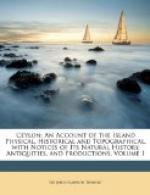But there is another work in which “Sarandib” does appear in the verse alluded to. PIETRO DELLA VALLE, in that most interesting letter in which he describes the manner in which he obtained at Damascus, in A.D. 1616, a manuscript of the Pentateuch on parchment in the Hebrew language, but written in Samaritan characters; relates that along with it he procured another on paper, in which not only the letters, but the language, was Samaritan—“che non solo e seritto con lettere Samaritane, ma in lingua anche propria de’ Samaritani, che e un misto della Ebraica e della Caldea.”—Viaggi, &c., Lett. da Aleppo, 15. di Giugno A.D. 1616.
The first of these two manuscripts is the Samaritan Pentateuch, the second is the “Samaritan version” of it. The author and age of the second are alike unknown; but it cannot, in the opinion of Frankel, date earlier than the second century, or a still later period. (DAVISON’S Biblical Criticism, vol. i, ch. xv. p. 242.) Like all ancient targums, it bears in some particulars the character of a paraphrase; and amongst other departures from the literal text of the original Hebrew, the translator, following the example of Onkelos and others, has substituted modern geographical names for some of the more ancient, such as Gerizim for Mount Ebal (Deut. xxvii. 4), Paneas for Dan, and Ascalon for Gerar; and in the 4th verse of the viiith chapter of Genesis he has made the ark to rest “upon the mountains of Sarandib.” Onkelos in the same passage has Kardu in place of Ararat. See WALTON’S Polyglot, vol. i. p. 31; BASTOW, Bibl. Dict. 1847, vol. i. p. 71.
According to the Mahawanso, the epithet of Sihale-dwipa, the island of lions, was conferred upon Ceylon by the followers of Wijayo, B.C. 543 (Mahawanso, ch. vii. p. 51), and from this was formed, by the Arabian seamen, the names Silan-dip and Seran-dib. The occurrence of the latter word, therefore, in the “Samaritan Pentateuch,” if its antiquity be referable to the reign of Rehoboam, would be inexplicable; whereas no anachronism is involved by its appearance in the “Samaritan version,” which was not written till many centuries after the Wijayan conquest.
There is another manuscript, written on bombycine, in the Bodleian Library, No. 345, described as an Arabic version of the Pentateuch, written between the years 884 and 885 of the Hejira, A.D. 1479 and 1480, and ascribed to Aba Said, son of Abul Hassan, “in eo continetur versio Arabica Pentateuchi quae ex textu Hebraeico-Samaritano non ex versione ilia quae dialecto quadam peculieri Samaritanis quondam vernacula Scripta est.”—Cat. Orient. MSS. vol. I. p. 2. In this manuscript, also, the word Sarendip instead of Ararat, occurs in the passage in Genesis descriptive of the resting of the ark.]
From their compilations, however, it appears that the information concerning Ceylon collected by the Macedonian explorers of India, was both meagre and erroneous. ONESICRITUS, as he is quoted by Strabo and Pliny, propagated exaggerated statements as to the dimensions of the island[1] and the number of herbivorous cetacea[2] found in its seas; the elephants he described as far surpassing those of continental India both in courage and in size.[3]




